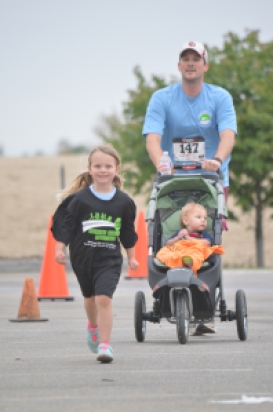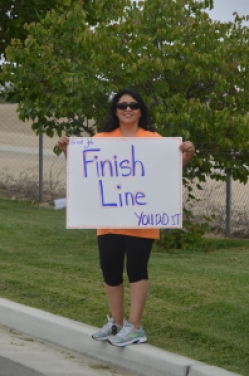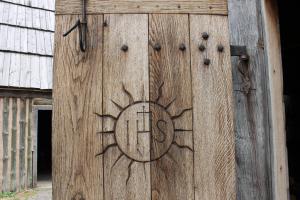All kinds of people run. People of all ages run. They run for all different reasons. I would think it is safe to say most people run because they enjoy it, or some aspect of the running experience. I am not a runner so I am speculating here, based on my observations and what I know of human nature. We get involved in things that we like to do or that are meaningful to us.

I was up early Saturday to be at the site of a 5K Race and 1 Mile Family Walk. You have to seriously like to run or walk to be at the venue that early! Or, in my case, serious about participating in something I believe in: the ministry of She Is Safe (www.SheIsSafe.org). They are reaching out to women and girls around the world to “prevent, rescue and restore” them from lives of slavery, oppression and abuse, in the context of lovingly telling and demonstrating the good news of Jesus Christ.
I was at the race as a member of the newly formed Bakersfield She Is Safe Advocacy Group which sponsored the race. I assisted on the sidelines as others walked and ran, their race fees providing funds for She Is Safe to expand their work to more women and girls in the hard places of the world, bringing hope and new life to them.

Just like I had a specific motivation to be at the race to assist, the runners each had their personal motivations for being there too. And on the strength of their inner drive they accomplished their goal: crossing that finish line. Some wanted to be first. Others simply wanted to finish.
They all met their goals of crossing the finish line on their own two feet (or in their strollers!) because they set their minds to do it. All the runners were applauded and many got trophies or awards for placing in various categories, but the feeling of “I did it!” had to be the best prize of all.
Though I am not a runner of foot races, I am a runner in the race of life. We all are. We each have a race marked out for us and it is our responsibility to set our minds to give it our all, our best. Like Paul, we should be “bringing all (our) energies to bear on this one thing: Forgetting the past and looking forward to what lies ahead, (we) strain to reach the end of the race and receive the prize for which God is calling us up to heaven because of what Christ Jesus did for us” [Philippians 3:13,14, TLB).[1]
“What Christ Jesus did for us” should be all the motivation we need to stick to the race course, regardless of how difficult the going may get at times. Keeping our eyes fixed on Jesus, “who for the joy set before him endured the cross”[2] for us, should help us keep putting one foot in front of the other with hope burning in our hearts. He finished his race and sat down next to the Father in heaven. He won salvation for all mankind, for any and all who will put their trust in him.
May we keep our eyes on the prize God has for us at the end of our race, motivated by the supreme sacrifice of Jesus Christ. May we live “to win for the Lamb that was slain the reward of His suffering.”[3]
For fun viewing, here’s a video of the 5K and Family walk: http://youtu.be/OtyYT3DPYGI
Photos and Video by www.proshowweb.com
[1] The Living Bible copyright © 1971 by Tyndale House Foundation. Tyndale House Publishers Inc., Carol Stream, Illinois 60188. All rights reserved. Taken from https://www.biblegateway.com/.
[2] Hebrews 12:2
[3] The battle cry of the Moravian Church’s missionary outreach, based on Isaiah 53:10-12. http://www.globaltribesoutreach.org/articlesmoravian
Originally posted on the Abide Prayer Group blog, a women’s ministry of The Bridge Bible Church of Bakersfield, CA.







